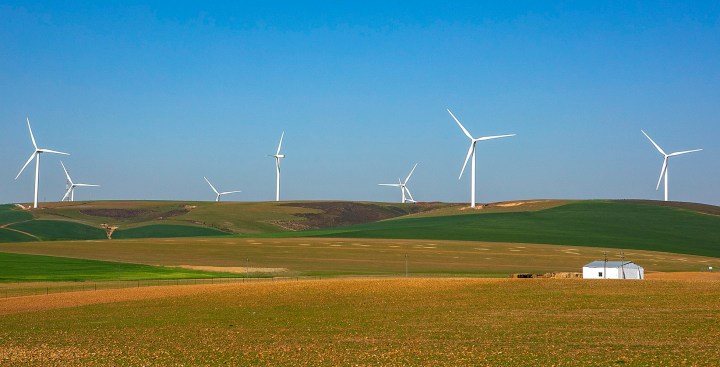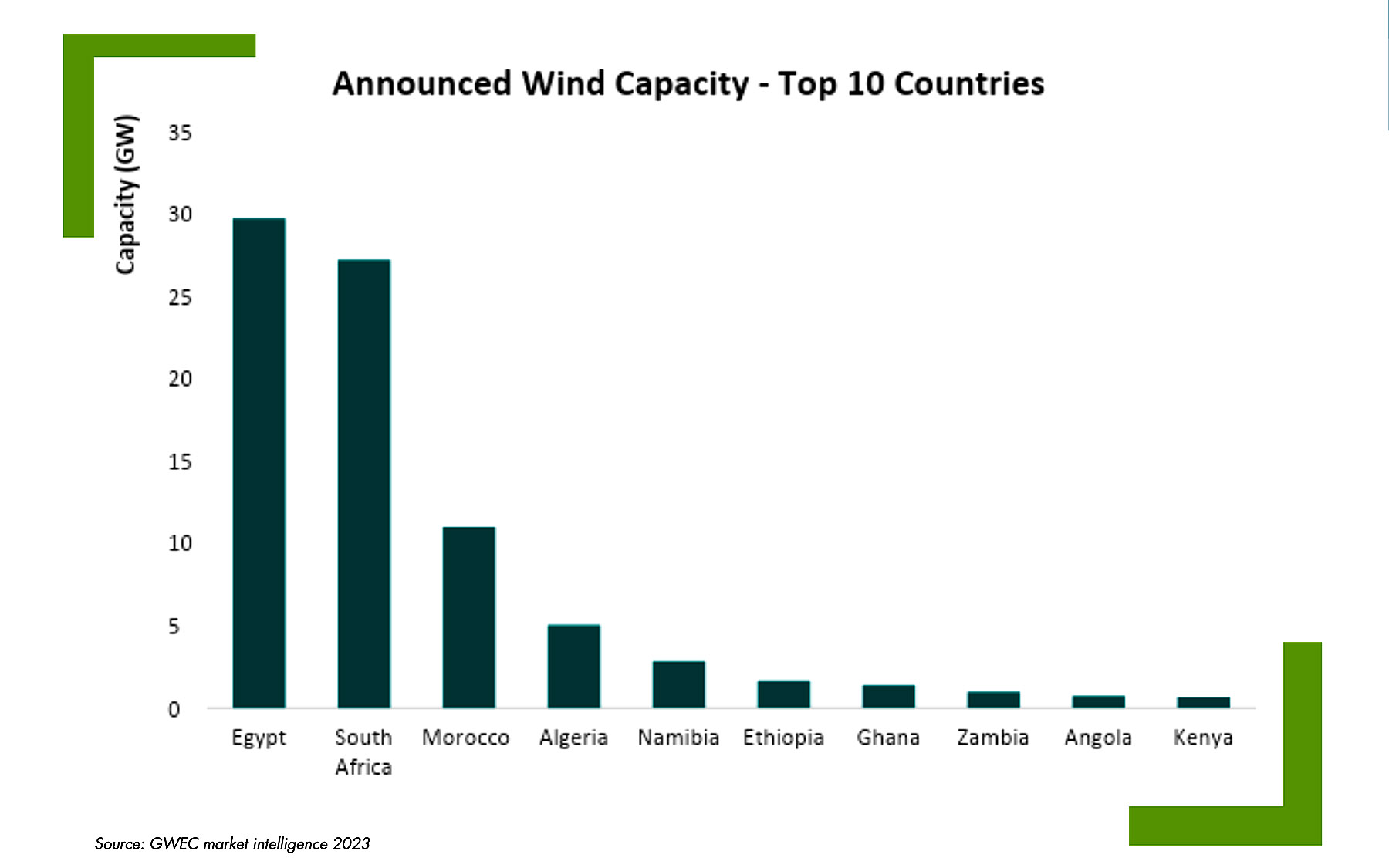RENEWABLE ENERGY
SA and Egypt leave the rest of Africa in the dust with their wind power pipeline and potential

There’s significant potential for wind energy projects in Africa to provide clean power to millions of people, but projects are at risk because of a lack of finance, grid constraints and unstable policies.
South Africa and Egypt are leading Africa with their installed capacity for clean wind energy, followed closely by Morocco. However, a significant number of potential wind energy projects across Africa are at risk because of a lack of finance, unstable policy regimes and grid constraints.
This is according to the first Status of Wind in Africa Report, which was launched by the Global Wind Energy Council (GWEC) at last week’s Windaba conference in Cape Town. The report maps out the continent’s current installed wind power plants and explores wind potential for African countries needing to achieve their climate goals and power supply needs.
A key finding of the report is that wind energy plays an indispensable role in Africa’s energy supply, already contributing significantly to national grids as a mainstream technology. Wind supplies 17% of Kenya’s total power generation and 15% of Senegal’s – but its transformational potential is still untapped.
A total of 83 wind farms – either installed or under construction and scheduled to be commissioned in 2023 – were identified across Africa, providing 9GW of clean power.
In addition, an analysis of the continent’s project pipeline showed that wind capacity could increase by more than 900%, with a total of 140 projects planned across Africa, representing another 86GW of new installed capacity on the horizon.
According to the report, each of the five subregions of Africa has significant wind energy potential to tap into, but this is being hindered by a lack of finance, unstable policy regimes and grid constraints.
The greatest potential for wind lies in northern Africa with a potential for 18,822GW, followed by western Africa with 9,144GW, central Africa with 2,651GW, eastern Africa with 2,133GW and southern Africa with 891GW.
North Africa led the pack not only with its potential wind energy, but also in terms of total installed capacity owing to the influence and early onset of renewable energy programmes in Egypt and Morocco, which commissioned initial utility-scale wind projects in 1988 and 2000, respectively.
Southern Africa, dominated by wind farms in South Africa, which were largely installed through the Renewable Energy Independent Power Producer Procurement Programme (REIPPPP), was found to have the second-highest installed wind capacity. Eastern Africa came in third with several operational wind farms in Ethiopia and Kenya.
South Africa, with a generation mix that remains heavily reliant on coal, has been pursuing renewable energy, now having concluded its sixth round of renewable energy auctions. As of 2022, the country’s installed electricity capacity of 54GW comprised 3.4GW wind, 2.3GW solar PV, 0.5GW of concentrated solar power, 0.6GW hydro, 39.8GW coal and 3.4GW diesel.
“Egypt, whose grid has historically been reliant on natural gas, is currently installing large-scale wind and solar, and targets to reach an installed capacity of 42% renewable energy in its power mix by 2030, according to its nationally determined contributions (NDCs) under the COP process,” the report stated.

Wangari Muchiri, director of Africa Wind Power, represented the GWEC at Windaba where she launched the inaugural report.
Muchiri said: “There are over 400GW of potential wind energy projects in the pipeline throughout Africa, which could provide clean, sustainable power to millions of people. Yet, these projects are at risk, and their realisation hangs in the balance due to challenges such as a lack of finance, unstable policy regimes and grid constraints.”

Wangari Muchiri. (Photo: Obama Foundation / Wikipedia)
Based on the report, Muchiri said it was clear that Africa was getting on with the energy transition, but policymakers needed to help clear the pathway, otherwise these projects could be at risk.
“The current capacity and strong pipeline of wind energy show that this region, which is particularly affected by climate change, yet has the world’s best renewable energy resource, is serious about the energy transition … In fact, South Africa is currently the largest wind market in Africa followed by Morocco and Egypt. South Africa has shown what is possible when vision, commitment, and collaboration align,” she said.
However, as this potential is recognised, the wind sector must acknowledge the harsh reality that exists in South Africa and across the rest of the continent.
Muchiri said the wind sector cannot turn a blind eye to the roadblocks that continue to hinder their progress, noting the disappointment of South Africa’s REIPPPP Bid Window 6, in which not a single wind project was awarded, despite the allocation being doubled.
“The story is replicated across the continent. This is a clear indication that there is much work to be done to ensure the continued growth and sustainability of the wind energy sector in South Africa,” she said.
Muchiri urged world leaders to step up at this year’s COP28 in Dubai and support Africa in becoming a renewable energy superpower by ensuring an increase in finance to the continent to unlock this significant potential.
Read more in Daily Maverick: ‘Effectively on ice’: Grid capacity constraints jeopardise some renewable energy projects
On South Africa’s growing wind sector, which remains hobbled by grid capacity constraints, Niveshen Govender, CEO of the South African Wind Energy Association (Sawea), said:
“Over the past year, we have witnessed extraordinary developments in the renewable energy landscape. As the world grapples with the urgent need to address climate change, wind energy has emerged as a leading solution … Sawea is encouraged to see the changing energy policy landscape being prioritised.”
He said the Electricity Regulation Act Amendment Bill could be viewed as the most critical piece of regulation to support South Africa’s transition from its centralised, vertically integrated electricity market towards a more competitive model.
The establishment of the independent Transmission System Operator and the multimarket system proposed in the bill is expected to unlock various opportunities within the sector.
According to the International Renewable Energy Agency, the development of the wind sector in Africa has been tied to policy interest and the geography of the wind resources. DM



















How much has our wind energy program been compromised by Gwede Mantashe’s crazy insistence over the past few years that SA must remain reliant on coal burning power stations? They’re old and unreliable and beset with hugely excessive ANC cadre deployment and entrenched corruption in Eskom. The billions of Rands which have been, and continue to be, spent on gas could have been utilised to build more wind farms. The country has paid dearly for Cyril Ramaphosa’s retention of this man as our Mineral Resources and Energy minister in the face of his incompetence and defiance of urgently needed reforms to take the country forward.
Wind is intermittent and there is no large-enough/reliable-enough backup to support even 1 city. Go nuclear for clean reliable energy.